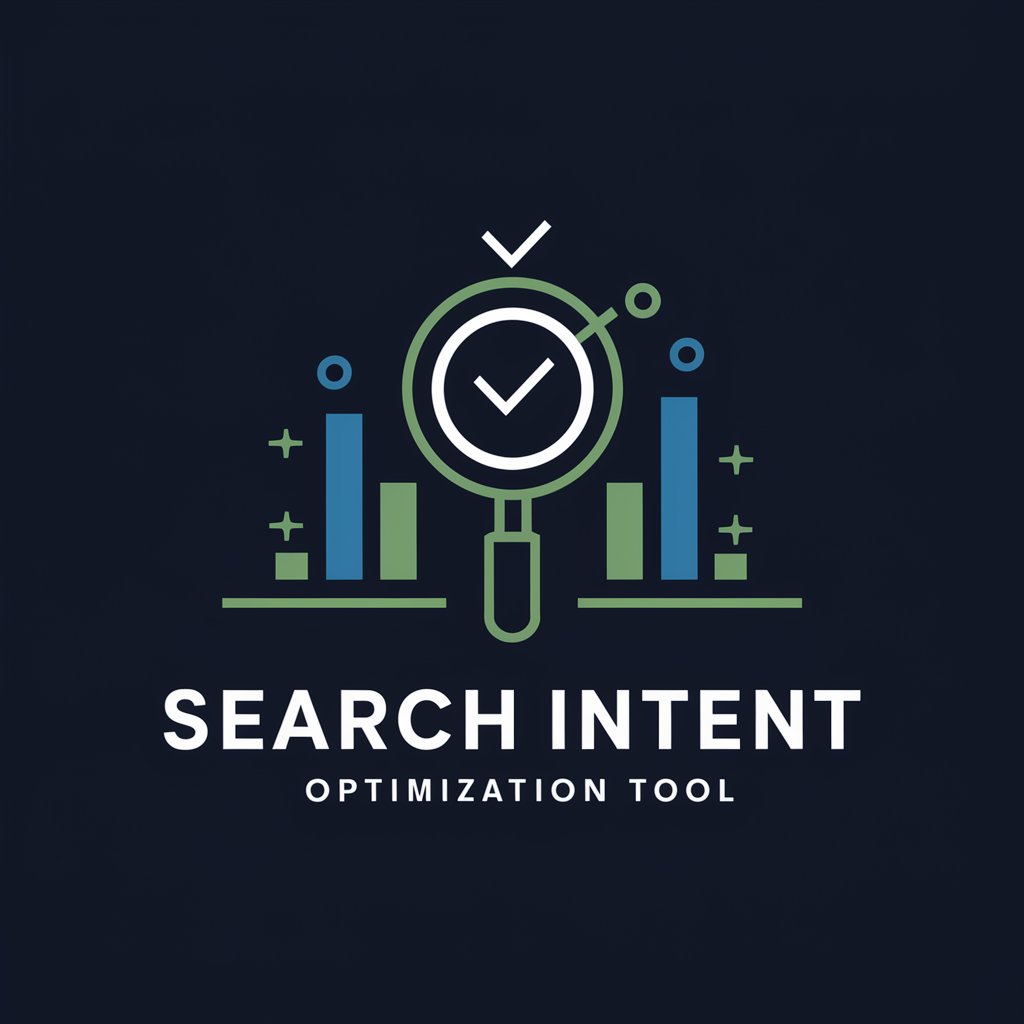
Search Intent - AI-Powered Search Analyzer

Hello! Let's dive into search intent analysis together.
Unraveling Search Queries with AI Precision
What are the key aspects of...
How can one effectively analyze...
The significance of understanding...
Methods to enhance the accuracy of...
Get Embed Code
Overview of Search Intent
Search Intent, embodied in the AI personality 'Quinn', is a sophisticated and analytical tool designed to analyze and interpret the intent behind search queries. It helps in understanding the underlying purpose of specific search terms, categorizing them into distinct types such as informational, navigational, transactional, or commercial. For example, a query like 'How to bake a cake' indicates an informational intent, seeking knowledge or information. Quinn's design is focused on offering insights into search behavior, assisting in tailoring content or search engine optimization strategies to align with user intent. Powered by ChatGPT-4o。

Key Functions of Search Intent
Intent Analysis
Example
Determining if a search term like 'nearest coffee shop' is navigational, aimed at finding a specific location.
Scenario
Used by local businesses to optimize their website for local searches.
Market Research
Example
Analyzing search terms related to a product, like 'best running shoes', to understand consumer research behavior.
Scenario
Used by retail companies to understand market trends and customer preferences.
Content Optimization
Example
Identifying informational intent in queries like 'tips for starting a garden' to create relevant content.
Scenario
Used by bloggers or content creators to align their articles or videos with what their audience is searching for.
SEO Strategy Development
Example
Understanding transactional intents in searches like 'buy organic coffee online' to enhance e-commerce strategies.
Scenario
Utilized by e-commerce platforms to optimize product pages and improve online sales.
Target User Groups for Search Intent
Digital Marketers
Professionals who can utilize search intent data to refine marketing strategies, optimize ad campaigns, and tailor content to audience needs.
Content Creators and Bloggers
Individuals who need to understand what their target audience is searching for to create relevant and engaging content.
SEO Specialists
Experts focused on improving website visibility in search engines can use search intent to enhance keyword strategy and user experience.
Business Owners
Small to medium business owners can benefit by understanding customer search behavior to optimize their online presence and product offerings.
Academic Researchers
Researchers in fields like linguistics, information technology, or marketing who are studying search behavior patterns and Internet linguistics.

Using Search Intent: A Step-by-Step Guide
Step 1
Visit yeschat.ai for a complimentary trial without needing to log in, bypassing the requirement for ChatGPT Plus.
Step 2
Select a specific search query or keyword to analyze for search intent, focusing on your target audience or subject matter.
Step 3
Utilize Quinn the Search Intent Profiler's insights to categorize the query into appropriate intent types: informational, brand, money, or research keywords.
Step 4
Apply Quinn's recommendations to optimize your content or search engine strategies, tailoring them to align with the identified search intent.
Step 5
Regularly reassess and update your search intent analysis, leveraging Quinn's evolving capabilities to stay abreast of changing search behaviors and trends.
Try other advanced and practical GPTs
VirtualTourGuideGPT
Explore History with AI-Powered Tours

ScriptMaster AI
Empowering Stories with AI

Mitzvot Torah
Explore Jewish teachings with AI

Find My Convict Ancestor
Uncover Your Convict Heritage with AI

Imaginative Story Weaver
Craft Visual Narratives with AI

Lamoom - Build your Company GPT
Tailoring AI to Transform Your Business

Free Financial Help with Bills Locator
Navigate financial aid with AI precision

NFT Listing Scout
Discover, Track, and Analyze NFTs with AI

Business Aviation Intelligence
Elevate Your Flight with AI-Powered Aviation Intelligence

Eden AGI Systems Engineer
Streamlining AI Development with Advanced Engineering

Navigator Prime
Empowering logistics with AI-driven insights

Legal Insight
Demystifying Legal Jargon with AI

Frequently Asked Questions about Search Intent
What exactly is Quinn the Search Intent Profiler?
Quinn is an AI-powered tool designed to analyze and categorize search queries into specific intents such as informational, brand, money, or research, helping users optimize their content for these targeted intents.
How can Search Intent improve SEO strategies?
By identifying the underlying intent of keywords, Search Intent assists in creating more relevant content, enhancing keyword targeting, and improving overall SEO effectiveness.
Can Search Intent help in understanding competitive landscapes?
Yes, it can analyze competitors' keywords, providing insights into their targeting strategies and revealing gaps or opportunities in your own approach.
Is Search Intent suitable for non-SEO professionals?
Absolutely, its user-friendly interface and clear categorizations make it accessible for marketers, content creators, and business owners who might not have in-depth SEO knowledge.
Does Search Intent offer real-time analysis?
Search Intent provides up-to-date insights, though not in real-time, due to the complex nature of processing and categorizing search query data.





